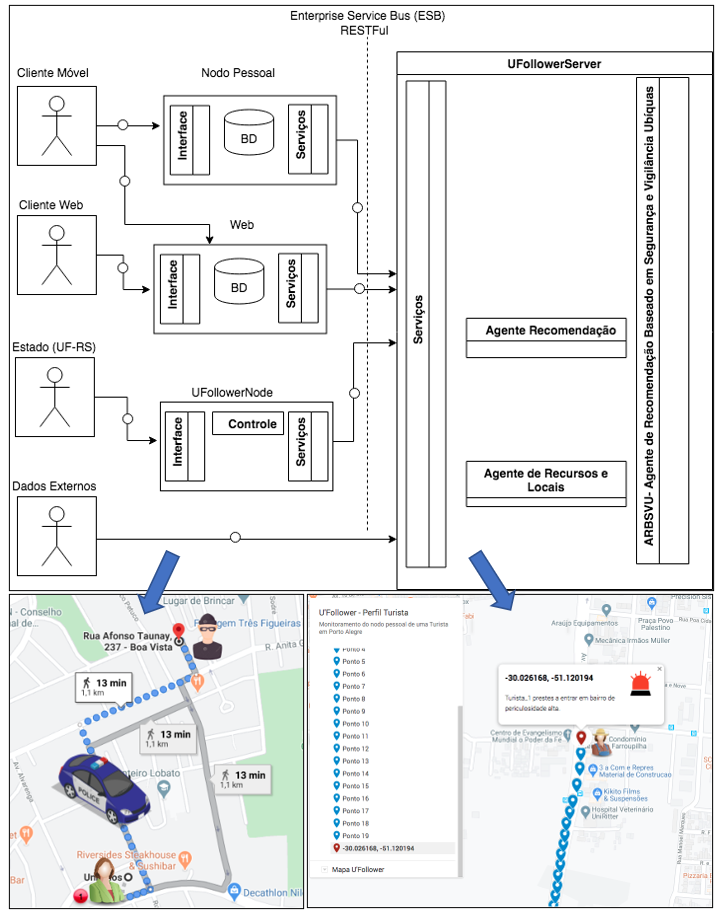UFollower: A Model for Smart Cities Based on Ubiquitous Security and Surveillance
Keywords:
Context History, Public Safety, Ubiquitous ComputingAbstract
Crime is one of the most critical problems in urban centers, especially in large cities. In this sense, technological solutions are needed to provide security to citizens, contributing to the reduction of crime rates. The present work proposes the UFollower model (Ubiquitous Follower) which meets this scenario. The scientific contribution of this work consists of the use of Context Histories and User Profiles for data analysis focused on ubiquitous security. The use of prediction mechanisms and historical contexts allowed to reach up to 70.35% of inference rate for a particular crime (domestic violence). The comparison with the related works indicates that UFollower is the only proposal that presents the issue of public security with context histories and user profile management. The evaluation was conducted through scenarios, allowing to evaluate the related hypotheses. In this sense, a context simulator was built where twenty objects interacted to allow the evolution. Among them, there are people, vehicles, cameras, and wearables.
Downloads
References
P. J. Navarathna and V. P. Malagi, “Artificial Intelligence in Smart City Analysis,” in 2018 Int. Conf. on Smart Systems and Inventive Technology (ICSSIT), Tirunelveli, India, 2018, pp. 44–47.
G. Piro, I. Cianci, L. A. Grieco, G. Boggia, and P. Camarda, "Information centric services in Smart Cities," J. of Systems and Software, vol. 88, no. 10, pp. 169–188, 2014.
V. Lisboa, "Violence atlas reveals homicide rate in Brazil up 4.2%," Agência Brasil, Accessed on: Sep. 09, 2019, [Online] Available: http://agenciabrasil.ebc.com.br/en/direitos-humanos/noticia/2019-06/violence-atlas-reveals-homicide-rate-brazil-42
A. Filippetto, R. Lima, and J. Barbosa, "A Risk Prediction Model for Software Project Management based on Similarity Analysis of Context Histories, " Information and Software Technology, vol. 106497, pp. 1-37, 2020.
Y. Pang, L. Zhang, H. Ding, Y. Fang, and S. Chen, "SPATH: Finding the Safest Walking Path in Smart Cities," IEEE Trans. on Vehicular Technology, vol. 68, no. 7, pp. 7071-7079, July 2019.
J. Ferreira, J. Visintin, J. Okamoto, and C. Pu, "Smart services: A case study on smarter public safety by a mobile app for University of São Paulo," in IEEE SmartWorld Ubiq. Intelligence and Comp., Advanced and Trusted Computed, Scalable Comp. and Communications, Cloud and Big Data Comp., Internet of People and Smart City Inn., San Francisco, CA, USA, 2017, pp. 1–5.
X. Zhao, N. Wang, R. Han, B. Xie, Y. Yu, M. Li, J. Ou, "Urban infrastructure safety system based on mobile crowdsensing," Int. J. of Disaster Risk Reduction, vol. 27, pp. 427–438, 2018.
M. Batista, T. Fariniuk, S. Mello, "Smart surveillance em aplicações recentes no Brasil: um estudo de caso nas cidades de Recife e Curitiba," Revista Gestão e Secretariado - Management and Administrative Professional Review, vol. 7, no. 2, pp. 104-137, 2016.
V. Babanne, N. Mahajan, R. Sharma, P. Gargate, "Machine learning based Smart Surveillance System," in 3rs Int. Conf. on IoT in Social, Mobile, Analytics and Cloud, Palladam, India, 2019, pp. 84-86.
K. Muchtar, F. Rahman, M. Munggaran, A. Dwiyantoro, R. Dharmadi, I. Nugraha, "A unified smart surveillance system incorporating adaptive foreground extraction and deep learning-based classification," in Int. Conf. on Artificial Intelligence in Information and Communication, Okinawa, Japan, 2019, pp. 302-305.
A. Khudhair and R. Ghani, "IoT Based Smart Video Surveillance System Using Convolutional Neural Network," in 6th Int. Eng. Conf. “Sustainable Technology and Development" (IEC), Erbil, Iraq, 2020, pp. 163-168.
A. Dey, G. Abowd, and D. Salber, "A conceptual framework and a toolkit for supporting the rapid prototyping of context-aware applications, " Human-Comput. Interact., vol. 16, no. 2, pp. 97–166, Dec. 2001.
A. Onisko, M. J. Druzdzel, and R. M. Austin, " Application of Bayesian network modeling to pathology informatics, " Diagnostic Cytopathology, vol. 47, no. 1, pp. 47-47, 2019.
L. Padgham and M. Winikoff, Developing Intelligent Agent Systems: A Practical Guide, vol. 13, UK: John Wiley & Sons, 2005.
S. Deshmukh, D. Mane, and A. Retawade, "Building a single page application Web front-end for e-learning site, " in 3rd Int. Conf. on Computing Methodologies and Communication, Erode, India, 2019, pp. 985-987.
F. Aslam, H. Mohammed, P. Lokhande, "Efficient Way of Web Development Using Python and Flask, " Int. J. of Advanced Research in Computer Science, vol. 6, no. 2, pp. 54–57, 2019.
H. Deitel and P. Deitel, Java: como programar, 8th ed., Brasil: Prentice-Hall, 2010.
M. Mannino and A. Abouzied, "Is this real? Generating synthetic data that looks real, " in 32nd Annual ACM Symp. on User Interface Software and Technology, New Orleans, USA, 2019, pp. 549-561.
M. Alawairdhi and E. Aleisa, "A Scenario-Based Approach for Requirements Elicitation for Software Systems Complying with the Utilization of Ubiquitous Computing Technologies," in IEEE 35th Annual Comp. Software and Applications Conf. Workshops, Munich, Germany, 2011, pp. 341-344.
E. Torres, "Cinco bairros concentram mais de um terço dos assassinatos de Porto Alegre em sete anos," Gaúcha ZH, Accessed on: Mar. 29, 2020, [Online] Available: https://gauchazh.clicrbs.com.br/seguranca/noticia/2018/03/cinco-bairros-concentram-mais-de-um-terco-dos-assassinatos-de-porto-alegre-em-sete-anos-cjehe8qep00zx01r4iug2ag1p.html
O. B. Mora, R. Rivera, V. M. Larios, J. R. Beltrán-Ramírez, R. Maciel and A. Ochoa, "A Use Case in Cybersecurity based in Blockchain to deal with the security and privacy of citizens and Smart Cities Cyberinfrastructures," in IEEE Int. Smart Cities Conf. (ISC2), Kansas City, USA, 2018, pp. 1-4.
A. H. Aguilar, J. C. Bonilla-Robles, J. C. Z. Díaz, and A. Ochoa, "Real-time video image processing through GPUs and CUDA and its future implementation in real problems in a Smart City," Int. J. of Combinatorial Optimization Problems and Informatics, vol. 10, no. 3, pp. 33-49, 2019.


